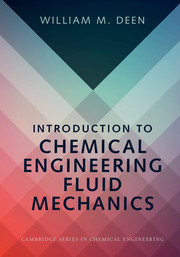Introduction to Chemical Engineering Fluid Mechanics Cambridge Series in Chemical Engineering Series
Langue : Anglais
Auteur : Deen William M.

Presents the fundamentals of chemical engineering fluid mechanics with an emphasis on valid and practical approximations in modeling.
Designed for introductory undergraduate courses in fluid mechanics for chemical engineers, this stand-alone textbook illustrates the fundamental concepts and analytical strategies in a rigorous and systematic, yet mathematically accessible manner. Using both traditional and novel applications, it examines key topics such as viscous stresses, surface tension, and the microscopic analysis of incompressible flows which enables students to understand what is important physically in a novel situation and how to use such insights in modeling. The many modern worked examples and end-of-chapter problems provide calculation practice, build confidence in analyzing physical systems, and help develop engineering judgment. The book also features a self-contained summary of the mathematics needed to understand vectors and tensors, and explains solution methods for partial differential equations. Including a full solutions manual for instructors available at www.cambridge.org/deen, this balanced textbook is the ideal resource for a one-semester course.
Preface; Table of contents; Lists of symbols; Part I. Use of Experimental Data: 1. Properties, dimensions, and scales; 2. Pipe flow: friction factor and pressure drop; 3. Drag, particles, and porous media; Part II. Fundamentals of Fluid Dynamics: 4. Fluid statics: pressure, gravity, and surface tension; 5. Fluid kinematics; 6. Stress and momentum; Part III. Microscopic Analysis: 7. Unidirectional flow; 8. Approximations for viscous flows; 9. Laminar flow with inertia; 10. Turbulent flow; Part IV. Macroscopic Analysis; 11. Macroscopic balances for mass, momentum, and energy; 12. Pipe flow: entrance effects, fittings, and compressibility; Appendix A. Vectors, tensors, and coordinate systems.
William M. Deen is the Carbon P. Dubbs Professor Emeritus in the Department of Chemical Engineering at Massachusetts Institute of Technology (MIT). He is an author of some 200 research publications in bioengineering, colloid science, membrane science, quantitative physiology, and toxicology, most involving aspects of diffusion or fluid flow. During his 40 years of teaching at MIT, he has focused on undergraduate and graduate fluid mechanics, heat transfer, and mass transfer. He is the author of Analysis of Transport Phenomena (2012), which is used internationally in graduate-level transport courses. Among his awards are the 2012 Bose Award for Excellence in Teaching from the MIT School of Engineering and the 2012 Warren K. Lewis Award for Contributions to Chemical Engineering Education from the American Institute of Chemical Engineers.
Date de parution : 08-2016
Ouvrage de 411 p.
18x25.4 cm
Thèmes d’Introduction to Chemical Engineering Fluid Mechanics :
© 2024 LAVOISIER S.A.S.



